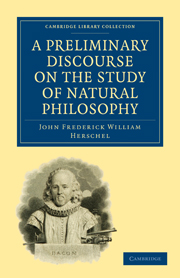Book contents
- Frontmatter
- Contents
- Dedication
- PART I OF THE GENERAL NATURE AND ADVANTAGES OF THE STUDY OF THE PHYSICAL SCIENCES
- CHAP. I Of Man regarded as a Creature of Instinct, of Reason, and Speculation. — General Influence of Scientific Pursuits on the Mind
- CHAP. II Of abstract Science as a Preparation for the Study of Physics. — A profound Acquaintance with it not indispensable for a clear Understanding of Physical Laws. — How a Conviction of their Truth may be obtained without it. — Instances. — Further Division of the Subject
- CHAP. III Of the Nature and Objects, immediate and collateral, of Physical Science, as regarded in itself, and in its Application to the practical Purposes of Life, and its Influence on the Well-being and Progress of Society
- PART II OF THE PRINCIPLES ON WHICH PHYSICAL SCIENCE RELIES FOR ITS SUCCESSFUL PROSECUTION, AND THE RULES BY WHICH A SYSTEMATIC EXAMINATION OF NATURE SHOULD BE CONDUCTED, WITH ILLUSTRATIONS OF THEIR INFLUENCE AS EXEMPLIFIED IN THE HISTORY OF ITS PROGRESS
- PART III OF THE SUBDIVISION OF PHYSICS INTO DISTINCT BRANCHES, AND THEIR MUTUAL RELATIONS
- Index
CHAP. II - Of abstract Science as a Preparation for the Study of Physics. — A profound Acquaintance with it not indispensable for a clear Understanding of Physical Laws. — How a Conviction of their Truth may be obtained without it. — Instances. — Further Division of the Subject
Published online by Cambridge University Press: 29 August 2010
- Frontmatter
- Contents
- Dedication
- PART I OF THE GENERAL NATURE AND ADVANTAGES OF THE STUDY OF THE PHYSICAL SCIENCES
- CHAP. I Of Man regarded as a Creature of Instinct, of Reason, and Speculation. — General Influence of Scientific Pursuits on the Mind
- CHAP. II Of abstract Science as a Preparation for the Study of Physics. — A profound Acquaintance with it not indispensable for a clear Understanding of Physical Laws. — How a Conviction of their Truth may be obtained without it. — Instances. — Further Division of the Subject
- CHAP. III Of the Nature and Objects, immediate and collateral, of Physical Science, as regarded in itself, and in its Application to the practical Purposes of Life, and its Influence on the Well-being and Progress of Society
- PART II OF THE PRINCIPLES ON WHICH PHYSICAL SCIENCE RELIES FOR ITS SUCCESSFUL PROSECUTION, AND THE RULES BY WHICH A SYSTEMATIC EXAMINATION OF NATURE SHOULD BE CONDUCTED, WITH ILLUSTRATIONS OF THEIR INFLUENCE AS EXEMPLIFIED IN THE HISTORY OF ITS PROGRESS
- PART III OF THE SUBDIVISION OF PHYSICS INTO DISTINCT BRANCHES, AND THEIR MUTUAL RELATIONS
- Index
Summary
(13.) Science is the knowledge of many, orderly and methodically digested and arranged, so as to become attainable by one. The knowledge of reasons and their conclusions constitutes abstract, that of causes and their effects, and of the laws of nature, natural science.
(14.) Abstract science is independent of a system of nature, — of a creation, — of every thing, in short, except memory, thought, and reason. Its objects are, first, those primary existences and relations which we cannot even conceive not to be, such as space, time, number, order, &c.; and, secondly, those artificial forms, or symbols, which thought has the power of creating for itself at pleasure, and substituting as representatives, by the aid of memory, for combinations of those primary objects and of its own conceptions, — either to facilitate the act of reasoning respecting them, or as convenient deposits of its own conclusions, or for their communication to others. Such are, first, language, oral or written; its conventional forms, which constitute grammar, and the rules for its use in argument, in which consists the logic of the schools; secondly, notation, which, applied to number, is arithmetic, — and, to the more general relations of abstract quantity or order, is algebra; and, thirdly, that higher kind of logic, which teaches us to use our reason in the most advantageous manner for the discovery of truth; which points out the criterions by which we may be sure we have attained it; and which, by detecting the sources of error, and exposing the haunts where fallacies are apt to lurk, at once warns us of their danger, and shows us how to avoid them.
- Type
- Chapter
- Information
- Publisher: Cambridge University PressPrint publication year: 2009First published in: 1830

